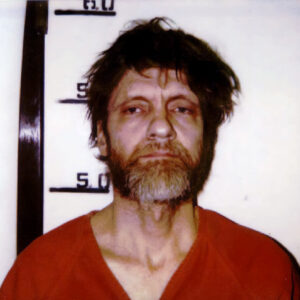June 30, 2023
Unabomber exemplifies dangers of the far-right’s romanticisation of terrorists
Police booking photo of Theodore Kaczynski, April, 1996
Picture by:
Federal Bureau of Investigation
On June 10, Theodore “Ted” Kaczynski, known as the Unabomber, died in prison at 81.
Born in 1942 in Chicago, Kaczynski was a mathematician, an alumnus of Harvard with a PhD from the University of Michigan, whom the FBI describes as a ‘twisted genius’. He earned fame after his hatred for modern technology – which, in his opinion, was destroying civilisation – resulted in an attempt to start a ‘revolution’.
Between 1978 and 1995, he targeted university staff and computer stores – hiding sixteen bombs in letters he mailed which killed three people and injured 23.
Scientists were in his crosshair because he perceived them to be responsible for pushing technological progress and thus, destroying the environment and ideas of nature. Computer stores, on the other hand, were, in his opinion, harming the human race by distributing dangerous technology to the public.
Kaczynski was finally arrested in 1996 and sentenced to four life sentences without a possibility of parole. After he died in a medical prison in North Carolina, a storm hit social media in the US and worldwide as numerous Unabomber fans wished him to rest in peace, revealing to the world a harmful and dangerous personality cult.
Unabomber himself admitted that he was inspired by – although it would be more accurate to say that he had the similar twisted ideas of – a French environmentalist philosopher Jacques Ellul, the author of The Technological Society (1954), while the idea that technology is dangerous itself and should be violently destroyed dates back until at least the 19th-century Industrial Revolution.
Yet, 27 years after Kaczynski was arrested, in the third decade of the 21st century, the ranks of his fans include right-wing conservatives on a crusade against multilateralism, multinational corporations, globalisation, and most importantly, aiming for the separation of people of different identities and ethnicities.
Brenton Tarrant was responsible for the 2019 Christchurch Mosque shootings in New Zealand – armed with an arsenal of firearms, he murdered 51 people and injured 40 before the police were able to arrest him.
In an emailed ‘manifesto’ to 30 recipients, including government officials, Tarrant explained that he desired an “ethnic autonomy for all peoples with a focus on the preservation of nature” and stated that “green nationalism is the only true nationalism.”
Effectively, Tarrant followed Kaczynski’s eco-terrorism but reinterpreted it to employ white supremacy and Islamophobia.
Unabomber’s ‘manifesto’ was directly quoted by a Norwegian neo-Nazi terrorist Anders Breivik, who committed terror attacks in Oslo and Utoya island in 2011, killing 77 people, mostly teenagers. Much like Tarrant, Breivik substituted the word “multiculturalism” for “leftism”.
Both Breivik and Tarrant illustrate how Ted Kaczynski inspired right-wing terrorists. It is easy to dismiss the influence Unabomber has on the contemporary far-right by claiming that these are examples of criminals or mentally unstable people prone to acts of violence. But this does not explain how a passage from Ted Kaczynski’s manifesto went viral on TikTok or why famous conservative journalists – like former Fox News star Tucker Carlson – openly agrees with some of his statements.
Unabomber’s ideas belong to historical archives and should not be given the spotlight. When they are the topics of mainstream media, we should be extremely concerned.




